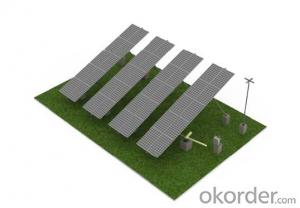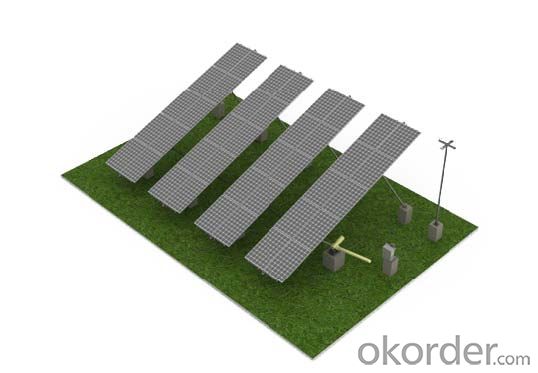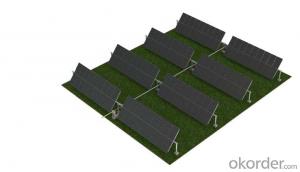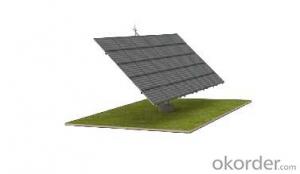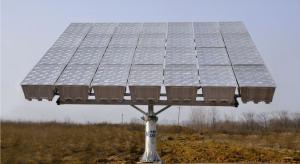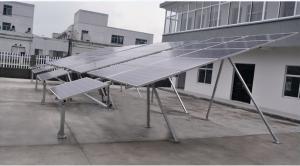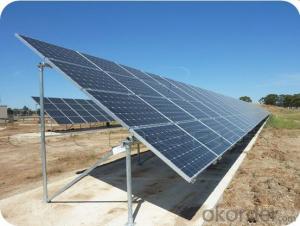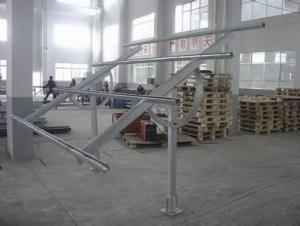Solar Energy Systems Llc Tilt Axis Tracking System Solar Mounting System
- Loading Port:
- China Main Port
- Payment Terms:
- TT OR LC
- Min Order Qty:
- -
- Supply Capability:
- -
OKorder Service Pledge
OKorder Financial Service
You Might Also Like
Packaging & Delivery
Packaging Detail:Normal package seaworthy
Delivery Detail:15 days
Specifications
Easy installation Competitive price TUV&SGS test report & CSA certification 15-warranty
Specifications
1) Super smooth beautiful appearance,outstanding quality,large supply.
2) Available in customized surface finishes.
3) Well machined,for example,cutting,drilling and milling with excellent tolerance.
4) Meet with customer’s designs and supply you best price.
5)Usages:Supply for solar panel modules.
Technical characteristics
Installation site:
ground,hillside,and grassland
Installation angle
it is based on customers’ requirements
Installation height
it is basedon customers’ requirements
Solar panel type; with or without frame
Components arrangement :horizontal or vertical
Support track
aluminum alloy extrusion
Quality warranty
15 years
Advantages
1)Quick installation: with high degree of pre-installed rate, the system could be easily installed by using galvanized carbon steel rails for PV Stent, and specially designed connection parts of the PV bracket, which could reduce installation time and cost greatly.
2)Offer unmatched durability: with all structural components comprised of high class stainless steel and anodized aluminum alloy, it is designed for 25 years service life and backed by 15 years warranty.
3)Stand up to extreme weather: The SuninTek solar mount is designed to stand up to the extreme weather complied with the AS/NZ 1170 and other international structure load standard by the skilled engineer. The main support components also have been tested to guarantee its structure and load-carrying capacity.
4)Provide broad installation flexibility: These systems accommodate most commercially available framed solar panels , and they can scale easily from small to large, multi-megawatt installations.
5)Diversified Application: The PV mounting system produced can be adopted by various types of PV cells panels which you can find in the market. It can serve for both mini solar power system and huge plant with megawatt capability.
Main features
1. Installation cost savings.
2. Save installation time.
3. Increase the mechanical strength of solar energy mounting to ensure that wind requirements.
4. The outdoor for installation of solar energy.
5. Length can be customized according to customers.
6. Service life of up to 25 years.
7. Products through the international certification.
8. Stent material composition of the galvanized steel and aluminum.
9. 15 years system and structural guarantee.
10.Flexible post spacing withstands different wind & snow loads.
11. High quality material in Aluminium 6005-T5 and SUS 304.
12.Screws and nuts go with every components needed.
13.Mechanical calculation and reliability tested to ensure highest product quality.
- Q: Can a solar energy system be installed in an area prone to hurricanes?
- Indeed, it is feasible to install a solar energy system in an area susceptible to hurricanes. Nevertheless, certain measures and considerations must be taken into account to guarantee the system's resilience and safety during extreme weather occurrences. First and foremost, it is advisable to utilize hurricane-resistant solar panels specifically engineered to endure powerful winds and airborne debris. These panels typically comprise reinforced glass and possess a higher wind load rating. Additionally, the mounting system employed should also be hurricane-resistant, featuring robust foundations and secure fastenings. Furthermore, the installation process should involve a comprehensive inspection of the area to identify any potential risks or hazards. Factors such as the elevation of the installation site, proximity to bodies of water, and adherence to local building codes should be taken into consideration to ensure the system is installed in a secure and safe manner. In hurricane-prone regions, it is also crucial to have a backup power system in place. This can be achieved through battery storage or a backup generator, which can supply electricity during power outages caused by severe weather. Regular maintenance and inspections play a vital role in the durability and safety of a solar energy system in hurricane-prone areas. This includes assessing the panels' integrity, wiring, and mounting structure, as well as trimming trees and foliage that could potentially harm the system during high winds. All in all, while it is possible to install a solar energy system in an area prone to hurricanes, it is imperative to adhere to specific guidelines and precautions to ensure the system's ability to withstand severe weather conditions and continue operating safely and efficiently.
- Q: Can solar energy systems be used for outdoor recreational activities?
- Yes, solar energy systems can definitely be used for outdoor recreational activities. Solar panels can be installed on rooftops, RVs, boats, and other outdoor structures to generate electricity. This renewable energy source can power various devices and equipment used during recreational activities such as camping, hiking, and boating. Solar energy systems provide a sustainable and environmentally friendly way to enjoy outdoor activities without relying on traditional power sources.
- Q: How does solar energy affect property value?
- There are various ways in which solar energy can positively impact property value. To begin with, homes that are equipped with solar panels are generally viewed as being more eco-friendly and energy-efficient, which appeals to an increasing number of homebuyers who prioritize sustainability. This rise in demand can result in an increase in property values. Moreover, solar panels can considerably reduce or even eliminate electricity bills, making a home more affordable to live in over time. This financial advantage can make a property more appealing to potential buyers and enhance its desirability. Additionally, certain studies have indicated that homes with solar panels sell at a faster rate when compared to those without, implying that solar energy can enhance a property's marketability. All in all, solar energy has the potential to raise property value by decreasing energy costs, attracting environmentally-conscious buyers, and boosting marketability.
- Q: What is the role of combiners in a solar energy system?
- The role of combiners in a solar energy system is to combine the electrical output from multiple solar panels into a single circuit, allowing for efficient and effective distribution of the generated energy. This helps to optimize the overall performance and reliability of the system by minimizing losses and ensuring the maximum utilization of the solar power generated.
- Q: Can solar energy systems be used in areas with limited access to solar tracking systems?
- Yes, solar energy systems can still be used in areas with limited access to solar tracking systems. While solar tracking systems can optimize energy generation by following the sun's movement throughout the day, they are not a requirement for solar energy systems to function. Solar panels can still generate electricity even without tracking systems by capturing sunlight during daylight hours. Additionally, advancements in fixed-tilt solar panels and other technologies have improved their efficiency, making them suitable for areas with limited access to solar tracking systems.
- Q: Can solar energy systems be installed in areas with high wind speeds?
- Yes, solar energy systems can be installed in areas with high wind speeds. However, it is important to ensure that the solar panels and supporting structures are designed and installed to withstand the specific wind conditions in the area. This may involve using stronger materials, anchoring systems, or tilt mechanisms to minimize the risk of damage from high winds.
- Q: Solar power generation system suitable for home, how much is the cost of a set?
- Solar photovoltaic power generation is suitable for families but to look at your location and sunshine time, before the country without a policy or honest with general electric, energy saving is a national matter we the people pay so without saving
- Q: Can solar energy systems be used in areas with high levels of vandalism or theft?
- Yes, solar energy systems can still be used in areas with high levels of vandalism or theft. However, additional security measures such as installing sturdy fences, security cameras, and alarm systems can be implemented to deter potential thieves or vandals and protect the solar panels and equipment. Additionally, community engagement and education programs can be helpful in raising awareness about the benefits of solar energy and discouraging theft or vandalism.
- Q: Can solar energy systems be used for powering military or defense installations?
- Certainly, military and defense installations can utilize solar energy systems to power their operations. In fact, numerous military and defense organizations worldwide are increasingly adopting solar energy systems as a dependable and sustainable power source. There are multiple reasons why solar energy systems are suitable for military and defense installations. Firstly, solar power is an abundant and widely accessible renewable energy source. This implies that military installations located in remote or off-grid areas can still have access to electricity without depending on costly and logistically challenging traditional fossil fuel-based generators. Additionally, solar energy systems offer a decentralized power supply option, reducing dependence on vulnerable and centralized power grids. This diminishes the susceptibility of military installations to power outages or attacks on critical infrastructure. Solar panels can be conveniently installed on rooftops, parking lots, or unused land within the military base, making optimal use of available space. Furthermore, solar energy systems necessitate minimal maintenance when compared to conventional power generation methods. This is especially advantageous for military or defense installations situated in remote or hostile environments, where regular maintenance and fuel supply for generators may be difficult or risky. Solar panels are long-lasting and durable, requiring only occasional cleaning and routine inspections. In addition to their reliability and resilience, solar energy systems offer economic advantages. By reducing reliance on fossil fuels, military installations can lower their operational costs and potentially save substantial amounts of money in the long term. These savings can then be allocated to other critical defense needs or utilized for the research and development of advanced military technologies. Moreover, the deployment of solar energy systems for military installations aligns with the global trend towards clean and sustainable energy solutions. It showcases a commitment to reducing greenhouse gas emissions and mitigating the impact of climate change, contributing to the overall sustainability objectives of military organizations. In conclusion, solar energy systems are a viable and practical choice for powering military or defense installations. They provide reliability, resilience, cost savings, and environmental benefits, making them an appealing option for military organizations seeking to optimize their energy supply and decrease their carbon footprint.
- Q: Can solar energy systems be used for powering off-grid eco-cities?
- Yes, solar energy systems can be used for powering off-grid eco-cities. Solar panels can be installed in these eco-cities to harness the sun's energy and convert it into electricity. This renewable energy source can then be used to power various needs within the city, such as lighting, heating, and even charging electric vehicles. By relying on solar energy, off-grid eco-cities can reduce their carbon footprint and promote sustainable living.
Send your message to us
Solar Energy Systems Llc Tilt Axis Tracking System Solar Mounting System
- Loading Port:
- China Main Port
- Payment Terms:
- TT OR LC
- Min Order Qty:
- -
- Supply Capability:
- -
OKorder Service Pledge
OKorder Financial Service
Similar products
Hot products
Hot Searches
Related keywords
